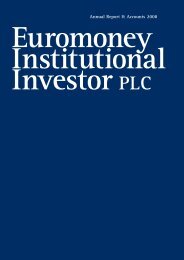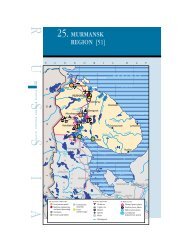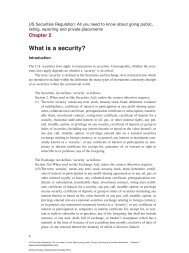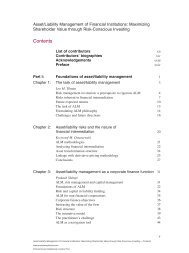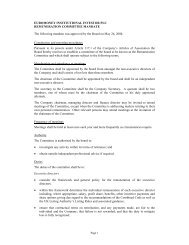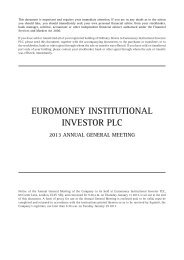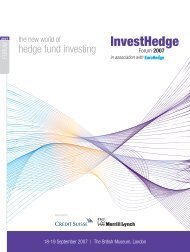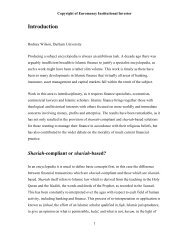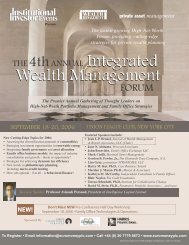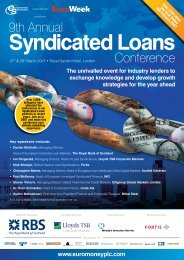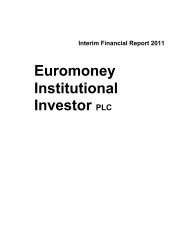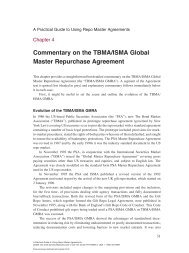Annual Report & Accounts 2012 - Euromoney Institutional Investor ...
Annual Report & Accounts 2012 - Euromoney Institutional Investor ...
Annual Report & Accounts 2012 - Euromoney Institutional Investor ...
You also want an ePaper? Increase the reach of your titles
YUMPU automatically turns print PDFs into web optimized ePapers that Google loves.
<strong>Euromoney</strong> <strong>Institutional</strong> <strong>Investor</strong> PLC <strong>Annual</strong> <strong>Report</strong> and <strong>Accounts</strong> <strong>2012</strong><br />
www.euromoneyplc.com<br />
Notes to the Consolidated<br />
Financial Statements<br />
Our Performance<br />
1 Accounting policies<br />
General information<br />
<strong>Euromoney</strong> <strong>Institutional</strong> <strong>Investor</strong> PLC (the ‘company’) is a company<br />
incorporated in the United Kingdom (UK).<br />
requirements for classifying and measuring financial assets and is<br />
likely to affect the group’s accounting for its financial assets. This<br />
standard has not yet been endorsed by the EU. The group is yet to<br />
assess IFRS 9’s full impact.<br />
● IFRS 10, ‘Consolidated Financial Statements’ (effective for accounting<br />
The group financial statements consolidate those of the company and its<br />
subsidiaries (together referred to as the ‘group’) and equity-account the<br />
group’s interest in associates. The parent company financial statements<br />
present information about the entity and not about its group.<br />
The group financial statements have been prepared and approved by the<br />
directors in accordance with the International Financial <strong>Report</strong>ing Standards<br />
(IFRS) adopted for use in the European Union and, therefore, comply with<br />
Article 4 of the EU IAS Regulation. The company has elected to prepare its<br />
parent company financial statements in accordance with UK GAAP.<br />
Judgements made by the directors in the application of those accounting<br />
policies that have a significant effect on the financial statements, and<br />
estimates with a significant risk of material adjustment in the next year,<br />
are discussed in note 2.<br />
(a) Relevant new standards, amendments and interpretations issued<br />
and applied in the <strong>2012</strong> financial year:<br />
● IAS 24 (revised), ‘Related party disclosures’, effective for accounting<br />
periods beginning on or after January 1 2011.<br />
● IFRIC 14, ‘Prepayments of a Minimum Funding Requirement<br />
Improvements to IFRSs 2010’, effective for accounting periods<br />
beginning on or after January 1 2011.<br />
● Amendments to IFRS 7 ‘Financial Instruments: Disclosures’, effective<br />
for accounting periods beginning on or after July 1 2011.<br />
● Improvements to IFRSs (2010), effective for accounting periods<br />
beginning on or after January 1 2011. Key amendments include:<br />
IFRS 1 – accounting policy changes in year of adoption and<br />
amendments to deemed cost (revaluation basis, regulatory assets);<br />
IFRS 3/IAS 27 – clarification of transition requirements, measurement<br />
of non-controlling interests, unreplaced and voluntarily replaced<br />
share-based payment awards; financial statement disclosures –<br />
clarification of content of statement of changes in equity (IAS 1),<br />
financial instrument disclosures (IFRS 7) and significant events and<br />
transactions in interim reports (IAS 34).<br />
None of these newly adopted standards have had a material impact on<br />
the group’s results in this financial year.<br />
(b) Relevant new standards, amendments and interpretations issued<br />
but effective in future accounting periods:<br />
● IFRS 9 ‘Financial Instruments’ issued in October 2010 (effective for<br />
accounting periods beginning on or after January 1 2015). This<br />
standard is the first step in the process to replace IAS 39 ‘Financial<br />
Instruments: recognition and measurement’. IFRS 9 introduces new<br />
periods beginning on or after January 1 2013). This standard builds<br />
on existing principles by identifying the concept of control as the<br />
determining factor in whether an entity should be included within<br />
the consolidated financial statements of the parent company and<br />
provides additional guidance to assist in the determination of control<br />
where this is difficult to assess. This standard has not yet been<br />
endorsed by the EU. The group is yet to assess IFRS 10’s full impact.<br />
● IFRS 11, ‘Joint Arrangements’ (effective for accounting periods<br />
beginning on or after January 1 2013). This standard replaces<br />
IAS 31, ‘Interests in Joint Ventures’ and requires a party to a joint<br />
arrangement to determine the type of joint arrangement in which it<br />
is involved by assessing its rights and obligations and then account<br />
for those rights and obligations in accordance with that type of<br />
joint arrangement. A joint venturer applies the equity method of<br />
accounting for its investment in a joint venture in accordance with<br />
IAS 28 ‘Investments in Associates and Joint Ventures (2011)’. Unlike<br />
IAS 31, the use of ‘proportionate consolidation’ to account for joint<br />
ventures is not permitted.<br />
● IFRS 12, ‘Disclosure of Interests in Other Entities’ (effective for<br />
accounting periods beginning on or after January 1 2013). This<br />
standard includes the disclosure requirements for all forms of<br />
interests in other entities, including joint arrangements, associates,<br />
special purpose vehicles and other off balance sheet vehicles. This<br />
standard has not yet been endorsed by the EU. The group is yet to<br />
assess IFRS 12’s full impact.<br />
● IFRS 13, ‘Fair Value Measurement’ (effective for accounting periods<br />
beginning on or after January 1 2013). This standard aims to improve<br />
consistency and reduce complexity by providing a precise definition<br />
of fair value and a single source of fair value measurement and<br />
disclosure requirements for use across IFRSs. The requirements, which<br />
are largely aligned between IFRSs and US GAAP, do not extend to the<br />
use of fair value accounting but provide guidance on how it should<br />
be applied where its use is already required or permitted by other<br />
standards within IFRSs or US GAAP. This standard has not yet been<br />
endorsed by the EU. The group is yet to assess IFRS 13’s full impact.<br />
● IAS 19 (revised), ‘Employee Benefits’, issued in June 2011 (effective<br />
for accounting periods beginning on or after January 1 2013). The<br />
impact on the group will be as follows: to eliminate the corridor<br />
approach and recognise all actuarial gains and losses in Other<br />
Comprehensive Income as they occur; to immediately recognise all<br />
past service costs; and to replace interest cost and expected return on<br />
plan assets with a net interest amount that is calculated by applying<br />
the discount rate to the net defined liability (asset). The group is yet<br />
to assess the full impact of the amendments.<br />
Notes to the Consolidated Financial Statements<br />
Company <strong>Accounts</strong> Group <strong>Accounts</strong> Our Governance<br />
61



